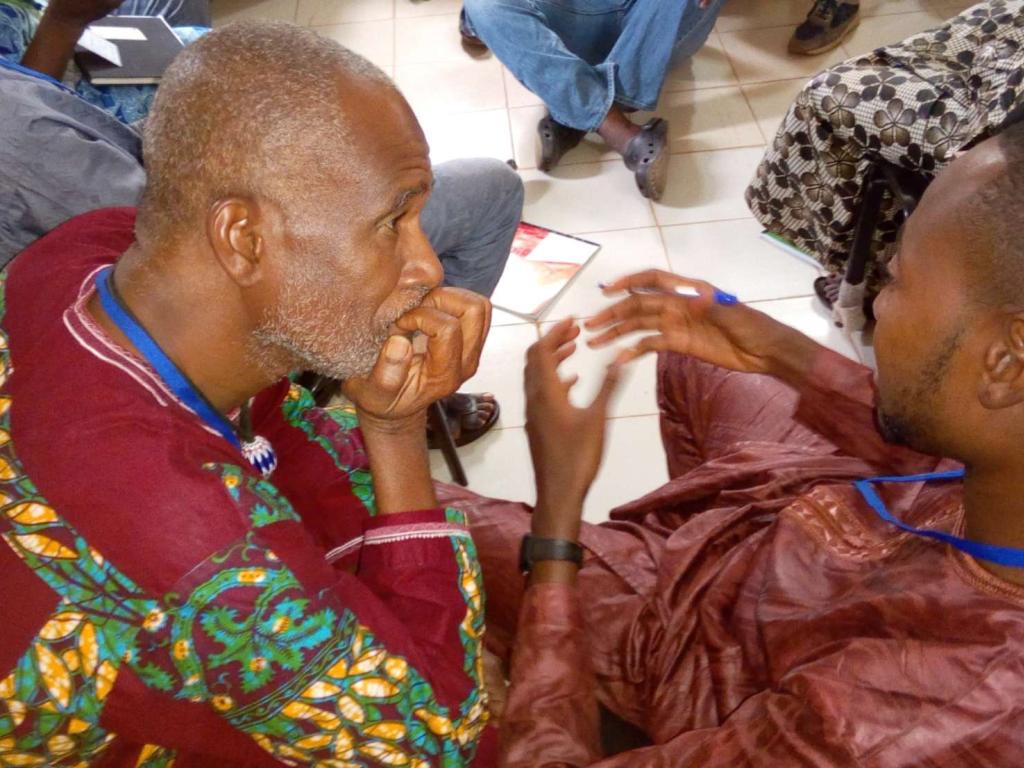Pathways for adaptive change: Insight from scenario outcomes in Mali

By Edmond Totin, Amadou Sidibe and Mary Thompson-Hall Researchers, ASSAR West Africa
Mali is one of the dryland countries exposed to critical and increasingly complex socio-environmental challenges, including population growth and urbanisation, which intersect with extreme climate events and generate shocks for livelihoods and food systems.

We ran two TSP workshops in Koutiala District, one of the climatically stressed regions of Mali, to enable people to anticipate plausible future challenges and accordingly design better-informed interventions.
Koutiala is one of the main agricultural production areas in Mali, and 80% of the economically-active population in this region is engaged in agriculture. However, Koutiala is stressed by a fast-growing population and increasing pressure on scarce natural resources. The region is also exposed to sporadic droughts and floods which makes the region’s agriculture activities highly vulnerable to climate variability and change.
The TSP process brought together stakeholders with different expertise, knowledge and values across national and subnational levels.
We developed scenarios to address the question: “What should agriculture and food security look like by 2035 to support livelihood improvement in Koutiala, under conditions of climate change?”
As a first step, 24 participants, including district officials, NGO staffs, village leaders and public servants, were asked to identify factors they thought could be important in driving changes in agriculture, food security and living conditions in the district by 2035. In a next step, storylines were developed in four groups, using the two most uncertain and influential drivers future changes to construct a scenario for the district in 2035: access to agricultural land and access to water for irrigation.
Based on the analysis of socio-economic conditions of the district, a no-regret option was selected and a set of piloting activities was accordingly designed by the scenario participants to strengthen their adaptive capacity. Activities were developed at both subnational (e.g. training of community members on rainwater harvesting and soil fertility management) and national (e.g, policy lobbying) levels.

The project team supported the community members to develop two proposals for local adaptation grants.
The first proposal is titled “Building young women’s resilience to climate change by connecting them to strategic opportunities”, which hypothesizes that creating reliable market opportunities for young women could inject much needed income into some of the poorest food-insecure rural households. This research is taking a small group of about 14 young women from seven villages of Koutiala through a process of action and learning about their own interactions can change the institutional configurations of which they are part. The activities have the explicit aim of linking them to remunerative opportunities and increasing their adaptive capacities.
In parallel, outcomes of the district-scenarios workshop informed discussions about sustainable agricultural development, which is critical to guarantee food security for the growing population in Mali. The information generated was subsequently used to inform National Parliament Members about the challenges faced by farmers in accessing short duration and quality seed, which is a major barrier to agricultural intensification.
In Mali, seed production, distribution and use are regulated by the new agricultural development framework, Loi d’Orientation Agricole. Despite this, more than 80% of the seed used still comes from the “unregulated” traditional seed systems, partly because farmers find the certification process expensive. Therefore, although farmers register as seed producers, they often continue engaging through informal networks, which affects crop yields and undermines efforts to promote improved varieties and to adapt to the changing agricultural conditions.
We conducted regular follow-up sessions on – six and 12 months after the completion of the TSP workshops – to monitor social changes that may have resulted from the scenario planning against key attributes of TSP as highlighted in the literature. Many scenario participants stressed their new-found capacity to better understand what climate change is and how to take action for a better future.
“Going through the scenario process and visualising what the community could be by 2035, helped us to start taking actions already, to prepare for future events.”
Participants agreed that the scenario workshops helped them to create new relationships, to get to know new people, and stimulated changes to practice. Mrs Kadiatou Dembele a journalist from the community radio, said:
“I am very happy that the scenario took us through the exploration of plausible future . Because I have been exposed to this exercise, I changed my programme line at the radio and now I try to sensitise the community to actions for a better future. I developed a specific radio show that encourages trees planting and efficient use of natural resources. This kind of action can help to prevent resource degradation and climate hazard.”
Further evaluation activities will continue in the course of the implementation of the adaptation grants to access changes that emerge from the scenario processes.
This article first appeared in the March 2018 ASSAR Spotlight